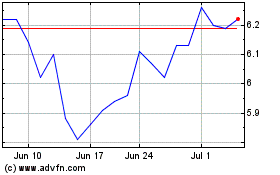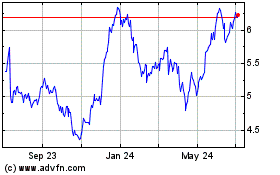(FROM THE WALL STREET JOURNAL 11/10/15)
By Don Clark and Jens Hansegard
STOCKHOLM -- Networking giants Ericsson AB and Cisco Systems
Inc. are forging an unusual alliance to better take on a rapidly
shifting global market and combat the rise of such rivals as
China's Huawei Technologies Co.
The pact, announced Monday, stops short of a full-blown merger
but has aspects of one: Ericsson, a leader in wireless equipment,
and Cisco, which dominates the market for Internet gear, will work
together to integrate existing equipment. They will combine some
sales and consulting efforts and, ultimately, may jointly develop
entirely new hardware and services.
Both companies are coping with challenges that include a
slowdown in the smartphone market, a longtime driver of revenues
for the telecom companies that are their biggest customers. They
also face heightened competition from Huawei, as well as a new
threat created by the pending 15.6 billion euros ($16.8 billion)
takeover of Alcatel-Lucent SA by Nokia Corp. Those rivals have
expertise in both wireless and Internet technologies, a combination
that Cisco and Ericsson hope to now match, said Pierre Ferragu, an
analyst at Sanford C. Bernstein.
At the same time, the deal underscores a widening recognition of
the downsides of large mergers, particularly cross-border
transactions that can face regulatory scrutiny in many
countries.
"Neither Ericsson or Cisco really believe that these large
mergers typically work," Chuck Robbins, Cisco's chief executive,
said in an interview.
Cisco and Ericsson, in negotiations for 13 months, said
alliances can bring benefits to companies and customers more
quickly. They projected their alliance would add $1 billion or more
in annual sales for each company by 2018.
"This is a much more agile and efficient choice," Hans Vestberg,
Ericsson's chief executive, said in an interview. "We can start
already tomorrow."
Analysts don't expect formal reviews by antitrust authorities,
but politicians on both sides of the Atlantic may take a close
look. Governments have been eager to closely monitor suppliers of
equipment regarded as highly sensitive for security and privacy
reasons. Huawei has been essentially shut out of the U.S. market
after a congressional report deemed it a risk to national
security.
Ericsson, a Swedish company that traces its history to 1876,
makes hardware that manages wireless connections, as well as
network operations and billing systems. Cisco, a Silicon Valley
company founded in 1984, is known for switches and routers that
connect computers together and to the Internet.
For Ericsson, the alliance could help retain its position as the
world's biggest telecom-equipment supplier by sales, just as its
Nordic rival Nokia regains strength. Nokia's takeover of
Alcatel-Lucent could create a powerful challenger to both Ericsson
and Cisco.
To find new revenues, analysts said, Cisco and Ericsson must
develop new products to cope with changes in the networks operated
by mobile and wireline carriers -- as well as exploit a trend
called the "Internet of Things," which will connect more everyday
devices to one another.
The other problem is Huawei, which recently overtook Ericsson in
the market for mobile infrastructure equipment, according to
analysts at Dell'Oro Group. Huawei received 30% of revenues in that
market during the first half of 2015, according to the research
firm, compared with 27% for Ericsson and 25% for the combination of
Nokia and Alcatel-Lucent.
Meantime, Ericsson's core business of supplying equipment has
suffered from price competition and from the relatively slow
rollout of broadband wireless networks, known by the acronym 4G, by
its carrier customers.
Cisco also faces pressure from Huawei. Dell'Oro estimates that
the Chinese company accounts for 13% of the global router business
-- Cisco has 49% -- but Huawei has displaced Cisco as No. 1 in
China.
Technology changes at telecom carriers are equally important.
"These service providers are looking to build their networks in a
different way," said Chris DePuy, a Dell'Oro analyst.
For one thing, telecom carriers are using computers equipped
with software for some of their key operations rather than buying
special-purpose equipment.
Those combinations, which Cisco is working to deliver, are
likely to be increasingly integrated with the kind of gear for
managing billing and operations that Ericsson specializes in, Mr.
DePuy said.
"That is one of the first things that is going to bring value to
the operators," Mr. Robbins said.
In the short term, one benefit of the alliance is for Ericsson
to resell Cisco networking gear. The Swedish company also has
65,000 service personnel that help advise carriers on how to build
networks. Cisco, which has 11,000 service workers, can take
advantage of the Ericsson staff, Mr. Robbins said.
Ericsson, which has around 116,240 employees, reported revenue
last year of 228 billion Swedish kronor ($26.3 billion). Cisco,
which employs 70,000 people, reported revenue of $49.2 billion in
its latest fiscal year, which ended in July.
The companies sell some competing equipment, but the overlap is
small. Cisco accounted for 1% of the wireless infrastructure market
in the first half, while Ericsson accounted for 1% of the routing
market, Dell'Oro estimates.
An added wrinkle of the partnership concerns patents. Ericsson,
a wireless pioneer, claims 37,000 patents to Cisco's 19,000. The
companies said they expected to complete a patent cross-license
agreement under which Cisco would pay an unspecified amount to
Ericsson for use of its patents.
Subscribe to WSJ: http://online.wsj.com?mod=djnwires
(END) Dow Jones Newswires
November 10, 2015 02:48 ET (07:48 GMT)
Copyright (c) 2015 Dow Jones & Company, Inc.
Ericsson (NASDAQ:ERIC)
Historical Stock Chart
From Mar 2024 to Apr 2024

Ericsson (NASDAQ:ERIC)
Historical Stock Chart
From Apr 2023 to Apr 2024
